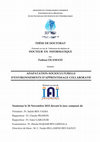Papers by Fadoua Ouamani
The goal of the ontology requirement specification document is to is to state why the ontology is... more The goal of the ontology requirement specification document is to is to state why the ontology is being built, what its intended uses are, who the end-users are, and which requirements the ontology should fulfill.
This paper focuses on socio-cultural user modeling in a social and intercultural collaborative co... more This paper focuses on socio-cultural user modeling in a social and intercultural collaborative context. we first, study and discuss several examples of user models in many research domains; we mainly focus on how these models are defined and represented. After that, we describe our generic and multidimensional socio-cultural profile, so, we define and justify its dimensions, its characteristics and its properties. We also describe the way the data to fill the model will be collected and updated. Finally, we discuss what we have presented and we give a brief plan of our future work to better address these important issues.
Saad/Information Systems for Knowledge Management, 2014
2014 IEEE/ACS 11th International Conference on Computer Systems and Applications (AICCSA), 2014
Saad/Information Systems for Knowledge Management, 2014

Journal of Decision Systems, 2014
ABSTRACT Computer Supported Collaborative Learning (CSCL) is a pedagogical approach wherein learn... more ABSTRACT Computer Supported Collaborative Learning (CSCL) is a pedagogical approach wherein learning takes place via social interaction using a computer or through the Internet. This kind of learning is characterized by the sharing and construction of knowledge among participants. This knowledge is shared through communication technologies embedded in CSCL systems. However in the context of globalization and the expansion of the internet and Information Technology (IT), communication becomes intercultural, so a complex and important dimension is added to CSCL and brings a new type of knowledge, socio-cultural knowledge, that needs to be shared and then presents new challenges. Therefore, in intercultural collaborative learning settings, we need to get and ensure better interaction, to get better learning. Better interaction is reached by promoting motivation to learn in groups, and this is obtained by enhancing user satisfaction which is achieved by the development of tailored CSCL tools to each user according to her socio-cultural background. Adapting the CSCL system to the culture of each participant will allow and facilitate group decision-making in the collaborative learning activity, as we take into account socio-cultural specificities of each learner, this latter will be more comfortable with the system and the other learners, and can collaborate with them to make decisions about the collaborative solution. So this article addresses the challenges started up by this context, which is how to consider socio-cultural specificities of each learner.
This paper focuses on socio-cultural user modeling in a social and intercultural collaborative co... more This paper focuses on socio-cultural user modeling in a social and intercultural collaborative context. we first, study and discuss several examples of user models in many research domains, we mainly focus on how these models are defined and represented. After that, we describe our generic and multidimensional socio-cultural profile, so, we define and justify its dimensions, its characteristics and its properties. We also describe the way the data to fill the model will be collected and updated. Finally, we discuss what we have presented and we give a brief plan of our future work to better address these important issues.
Modélisation utilisateur et …
Thesis Chapters by Fadoua Ouamani

Within collaborative learning environments, learners from different socio-cultural background may... more Within collaborative learning environments, learners from different socio-cultural background may interact together. These learners evolve within various cultures and social contexts and acquire different socio-cultural values and behaviors. They develop different needs, points of view and learning styles. Thus, they should be supported while communicating and collaborating together. In fact, the communication and collaboration tools provided to each learner should be appropriate according to her/his personal context and socio-cultural profile allowing her/him to learn actively and effectively in a group. Besides, the presentation of information, information structure and the interaction should be possible in different forms and with various media (text, image, audio, visual, audiovisual, symbols for facial expression transmission, pictures and videos). In the last few years and over the last decades, there was a growing interest in the development of Computer Supported Collaborative learning (CSCL) environments. However, the existing systems ignore the variety of learners and their socio-cultural differences especially in the case of distant learning. In fact, the socio-cultural impacts were demonstrated both on learner characteristics (behaviors, cognition, emotion, personality and learning), and on collaborative learning environment variables (communication, collaboration style, on learning style and behavior, motivation and participation). The main goal of this thesis work is to propose an approach to integrate and operationalize social and cultural differences between learners when developing CSCL environments. Therefore, our problem statement is as follows: First, identify, define and model the socio-cultural user background, then propose a socio-cultural adaptation approach of computer supported collaborative learning environments (from the early conceptualization phase to the operationalization phase and the final use of the system).To address this problem statement, the main contributions of this thesis are: the proposition of an ontological framework to model the socio-cultural knowledge and their influences on CSCL environments and the definition of an adaptation approach based on and guided by this framework. The latter is formed by two complementary ontologies: 1) SOCUDO : a generic ontology (domain independent) which models the socio-cultural user characteristics as well as knowledge about the influences of culture on personality, preferences and cognition 2) SCACLO: a generic domain ontology that models the CSCL domain variables that are socio-culturally sensitive. Literature reviews and studies were done within humanities and social sciences and within educational sciences to extract the socio cultural specificities of CSCL learners. Based on the finding of these studies, adaptation rules were built. In order to validate these rules, a trilingual online survey (Arabic, French and English) was widely circulated online targeting three cultures (Tunisian, French and American). The results of this survey were used to refine these rules. The proposed adaptation process based on these rules is a dynamic process that supports both adaptability (by generating automatically adapted recommendations to the user) and adaptivity (by involving the user in the adaptation process and allowing him/her whether to accept recommendations proposed by the system or to decline them and choose others. Long term adaptation rule Refinement and extraction of new knowledge about the user is ensured by the observation and machine learning of the user interaction behavior with the system and with others. To operationalize the ontological framework and the socio-cultural adaptation approach, we implement a collaborative editing CSCL environment that offers adapted functionalities according to the socio-cultural learner profile. The proposed system is able to solve the intercultural communication problems by notifications and intelligent intermediation in order to promote group awareness.








Uploads
Papers by Fadoua Ouamani
Thesis Chapters by Fadoua Ouamani